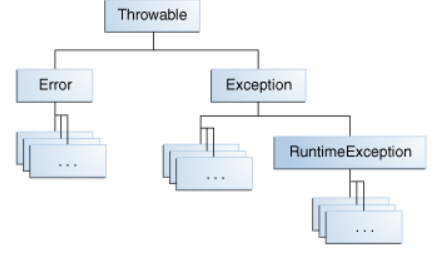
Exceptions:
Exception in java, represents an exceptional event. It is an event that disrupts the program’s normal flow, during program execution. We can handle exceptions by using try-catch or throws keywords. Exceptions are divided into following two categories: checked exceptions and unchecked exceptions.
e.g. – NullPointerException, ArithmeticException, IOException, SQLException etc.
Note: Exceptions generally occur because of the code of our program.
Example: Exception
public class Main { public static void main(String[] args) { int num1 = 10, num2 = 0; // Try to divide by zero try { int result = num1 / num2; } catch (ArithmeticException e) { e.printStackTrace(); } } } |
Output
java.lang.ArithmeticException: / by zero at Main.main(Main.java:9) |
Error:
Errors represents the exceptional conditions that are not checked by compiler at the compile time, they are checked at runtime. An error will not force you to use try-catch or throws keywords to handle it. Error and their subclasses are used to represent errors. Errors are irrecoverable and can’t be avoided by programmer. That means, it surely terminate the program abnormally.
e.g. – StackOverFlow, OutOfMemoryError etc.
Note: Errors generally occur because of the lack of the system resources. Errors represents the unchecked types.
Example: Error
class StackOverflow { public static void testError(int num) { if (num == 0) return; else { testError(num++); } } } public class Main { public static void main(String[] args) { StackOverflow.testError(1); } } |
Output
Exception in thread "main" java.lang.StackOverflowError at StackOverflow.testError(Main.java:7) |
Note: Even if we handle errors using try-catch blocks, application will not recover if errors happened.
Difference between ERRORS and EXCEPTIONS in Java
| ERROR | EXCEPTION |
| It can be caused due to lack of system resources. | It can be caused due to bad code. |
| It represents an irrecoverable event. | It represents a recoverable event. |
| Errors cannot be handled by program code. | Errors cannot be handled by program code (using try, catch, and throw keywords). |
| In case of error program will terminate abnormally. | In case of exception, we can handle it by using try, catch or throws keyword and hence can control the abnormal termination of program. |
| Errors are of unchecked type. | Exceptions can be of checked or unchecked type. |
| Errors defined in java.lang.Error package. | Exceptions defined in java.lang.Exception. |
| Examples:
OutOfMemory, StackOverFlow. |
Examples:
Checked Exceptions : NoSuchMethod, ClassNotFound. |
Java interview questions on Exception Handling
- what is an exception?
- How the exceptions are handled in java?
- What is the difference between error and exception in java?
- Can we keep other statements in between try catch and finally blocks?
- Explain the exception hierarchy in java?
- What are runtime exceptions in java?
- What is outofmemoryerror in java?
- What are checked and unchecked exceptions in java?
- What is the difference between classnotfoundexception and noclassdeffounderror in java?
- Will finally block get executed if return?
- Can we throw an exception without throws?
- What is rethrowing an exception in java?
- What is the use of throws keyword in java?
- What is exception propagation in java?
- Difference between throw and throws in java?
- What is finally in java?
- What is the difference between final finally and finalize in java?
- How to create customized exceptions in java?
- What is classcastexception in java?
- What is stackoverflowerror in java?
- What is the superclass of all exception classes?
- What is the use of printstacktrace method in java?
- What is arraystoreexception in java?